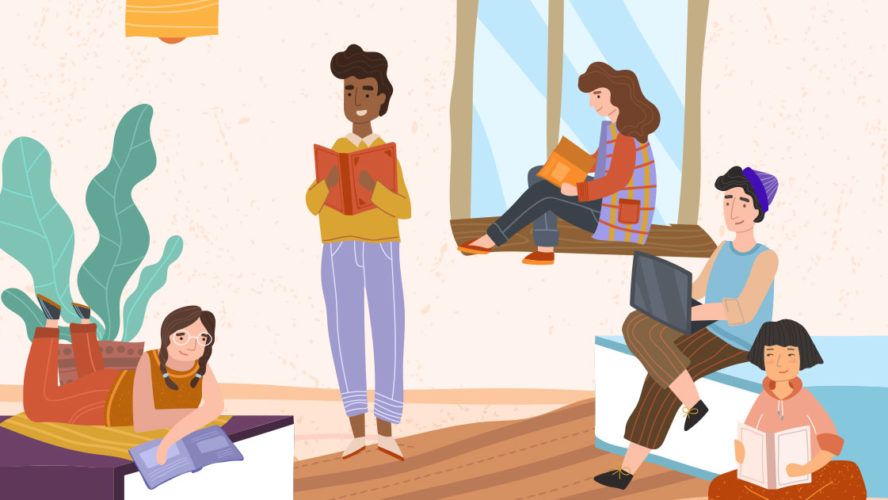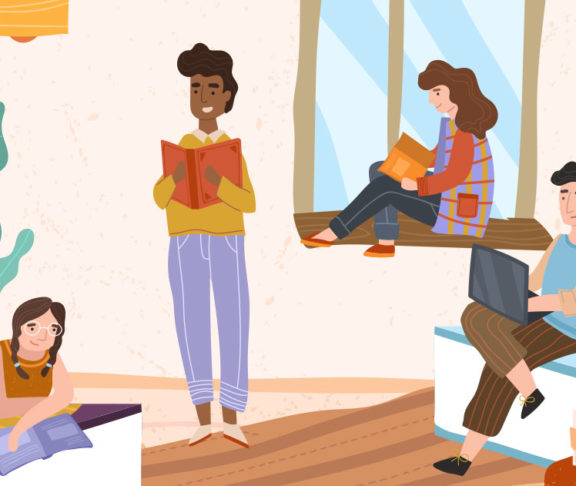It’s no secret that since the pandemic, kids today are feeling more isolated than ever — especially kids from marginalized backgrounds like LGBTQ+ teens. Get Lit, a spoken word poetry program for high schoolers, has the doubly positive impact of giving these kids an outlet for self-expression and community while encouraging an interest in English and literature.
Diane Luby Lane, Get Lit’s founder and executive director, explains how the program works, “We introduce classic spoken word poems written by great poets and authors. And we read them aloud and students have to raise their hand and claim the piece that really speaks to them.”
Students are then tasked with memorizing and reciting the poem they’ve claimed aloud. “So let’s say you’re going through something in your own life, and you hear somebody’s words that completely speak to how you feel in your heart, that maybe you don’t have words for,” Lane says. “You raise your hand and you claim that piece. And that’s a very empowering moment because someone, a master in their field, is putting words to a feeling that you have. So you don’t feel alone.”
The next step is for students to write their own poem and share their own stories. “And then it’s like the crack opens and young people are able to say, okay, this is who I really am. This is what I’m really going through,” Lane says.
Finding an identity
Lane says that Get Lit programs use works written by a diverse catalog of poets, so every student can feel that their identity is represented.
“Oftentimes, marginalized youth are not given any place to speak about some of the trauma in their lives. And this can be very disruptive in school,” she says. All of this can be compounded by social media, Lane notes, which encourages everyone to only show their best selves, not necessarily their true selves, which can be even more triggering.
This is why it can be a powerful moment for a marginalized kid to suddenly hear their own experience reflected in a work of art. For instance, Lane says, “this poem by Cameron Awkward Rich — who’s a trans poet — is speaking in beautiful language about some issue. And now I’m a young person who thinks, ‘wow, this, I relate to this poet. I relate to their life story. I’m inspired by their success.’”
While students don’t have to share their own stories publicly if they feel it is too personal, Lane says that many are often eager to share with their peers. “And as they share, other kids are like, wow, me too. You know, I’m going through similar issues.” Lane continues, “So for LGBTQ+ kids, there’s snaps, there’s community, there’s laughter, there’s embrace.”
Celeb status
One student who sticks out for Lane is a gay boy who became a sort of celebrity in his high school after sharing his poetry with the Get Lit program.
“His name was Sam,” Lane says. “And it was just about being a sassy, gay, young, Asian American boy and what he goes through and how he’s gonna turn ‘lemon.’ And he’s gonna have a sassy comeback at all times, and he’s gonna speak for all the other gay kids that maybe aren’t able to come up with a quick comeback like he can, to cut people when he feels hurt. And he put it all through this metaphor about lemons, which was in the classic poem.” Lane explains, “So it’s just an example of someone that’s able to take feelings that he’s had for however long in his life, find an artistic piece that speaks to it, share it on a stage with his own story, and absolutely bring the crowd to their feet.”
Sam’s poetry got him standing ovations, snaps, and was shared all over the internet, according to Lane. She said he’s become “sort of a rock star” in his school now.
Watching kids’ lives transformed by poetry even makes Lane emotional.
“I just, it makes me cry,” she admits. “Just thinking about all these beautiful young people that don’t properly get the chance to be just celebrated for being alive, for being their own authentic selves, for the beautiful variety in which people show up and say yes to this world and their full glory, it looks different for every person.”

